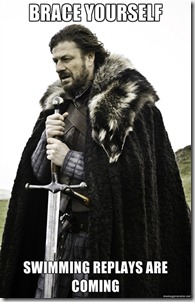Home » Posts tagged 'article'
Tag Archives: article
Olympic Trolls: Mainstream Memes and Digital Discord?
 The themed issue of the Fibreculture journal on Trolls and the negative space of the internet has been released, with a raft of amazing articles, including my piece ‘Olympic Trolls: Mainstream Memes and Digital Discord?’ looking at the mainstreaming of some techniques associated with trolling, using a case study of a Facebook group lamenting the quality of Channel 9’s coverage of the 2012 Olympics.
The themed issue of the Fibreculture journal on Trolls and the negative space of the internet has been released, with a raft of amazing articles, including my piece ‘Olympic Trolls: Mainstream Memes and Digital Discord?’ looking at the mainstreaming of some techniques associated with trolling, using a case study of a Facebook group lamenting the quality of Channel 9’s coverage of the 2012 Olympics.
The abstract:
While the mainstream press have often used the accusation of trolling to cover almost any form of online abuse, the term itself has a long and changing history. In scholarly work, trolling has morphed from a description of newsgroup and discussion board commentators who appeared genuine but were actually just provocateurs, through to contemporary analyses which focus on the anonymity, memes and abusive comments most clearly represented by users of the iconic online image board 4chan, and, at times, the related Anonymous political movement. To explore more mainstream examples of what might appear to be trolling at first glance, this paper analyses the Channel Nine Fail (Ch9Fail) Facebook group which formed in protest against the quality of the publicly broadcast Olympic Games coverage in Australia in 2012. While utilising many tools of trolling, such as the use of memes, deliberately provocative humour and language, targeting celebrities, and attempting to provoke media attention, this paper argues that the Ch9Fail group actually demonstrates the increasingly mainstream nature of many online communication strategies once associated with trolls. The mainstreaming of certain activities which have typified trolling highlight these techniques as part of a more banal everyday digital discourse; despite mainstream media presenting trolls are extremist provocateurs, many who partake in trolling techniques are simply ordinary citizens expressing themselves online.
The full paper is freely available online, and as a PDF.
Joss Whedon, Dr. Horrible, and the Future of Web Media?

I’m pleased to announce that my article Joss Whedon, Dr. Horrible, and the Future of Web Media? is finally available. Here’s the abstract:
In the 2007 Writers Guild of America strike, one of the areas in dispute was the question of residual payments for online material. On the picket line, Buffy creator Joss Whedon discussed new ways online media production could be financed. After the strike, Whedon self-funded a web media production, Dr. Horrible’s Sing-Along Blog. Whedon and his collaborators positioned Dr. Horrible as an experiment, investigating whether original online media content created outside of studio funding could be financially viable. Dr. Horrible was a bigger hit than expected, with a paid version topping the iTunes charts and a DVD release hitting the number two position on Amazon. This article explores which factors most obviously contributed to Dr. Horrible’s success, whether these factors are replicable by other media creators, the incorporation of fan labor into web media projects, and how web-specific content creation relates to more traditional forms of media production.
The official version is available in the new issue of Popular Communication (vol 11, no. 2). If you can’t access the article due to the paywall, then there’s an open access pre-print available at Academia.edu.
Digital Culture Links: November 24th 2010
Links for November 19th 2010 through November 24th 2010:
- Long Live the Web: A Call for Continued Open Standards and Neutrality [Scientific American] – Inventor of the World Wide Web, Tim Berners-Lee, in a passionate defense of the open web (and a few pointed jabs at Facebook): “The Web is now more critical to free speech than any other medium. It brings principles established in the U.S. Constitution, the British Magna Carta and other important documents into the network age: freedom from being snooped on, filtered, censored and disconnected. […] If we want to track what government is doing, see what companies are doing, understand the true state of the planet, find a cure for Alzheimer’s disease, not to mention easily share our photos with our friends, we the public, the scientific community and the press must make sure the Web’s principles remain intact—not just to preserve what we have gained but to benefit from the great advances that are still to come.”
- Everything is a Remix – Part 1 [Vimeo] – Kirby Ferguson’s great video about remix, focusing on musical culture and the long history of remix as a core creative process (long before the web).
- The Attention-Span Myth [NYTimes.com] – A great read: “Whether the Web is making us smarter or dumber, isn’t there something just unconvincing about the idea that an occult “span” in the brain makes certain cultural objects more compelling than others? So a kid loves the drums but can hardly get through a chapter of “The Sun Also Rises”; and another aces algebra tests but can’t even understand how Call of Duty is played. The actions of these children may dismay or please adults, but anyone who has ever been bored by one practice and absorbed by another can explain the kids’ choices more persuasively than does the dominant model, which ignores the content of activities in favor of a wonky span thought vaguely to be in the brain. So how did we find ourselves with this unhappy attention-span conceit, and with the companion idea that a big attention span is humankind’s best moral and aesthetic asset? […] Instead, the problem with the attention-span discourse is that it’s founded on the phantom idea of an attention span.”
- New Facebook Messaging Continues to Block Some Links [Epicenter | Wired.com] – Facebook’s “not email” email system will block certain links. Definitely not email. “Facebook’s “modern messaging system” may make it convenient to seamlessly move between instant messaging and a Facebook.com e-mail account, but not if you are sharing a link to a file sharing site. Facebook began blocking BitTorrent link-sharing on Facebook walls and news feeds last spring, and also started blocking private messages between users that included a link to torrents on the Pirate Bay. Facebook says that content censorship policy isn’t changing, even as its new Facebook Messages service gives users e-mail accounts and encourages them to communicate even more through Facebook. “We have systems in place to prevent abuse on Facebook and prevent spam which we’ll continue to deploy with the new Messages,” a Facebook spokeswoman said in a written statement. “We don’t share specifics on those systems.””
- Facebook credits go on sale in UK [guardian.co.uk] – This is Facebook’s answer to the app store; watch the money flow! “Online currency, with which Facebook users can purchase pixel-based virtual farm animals or pay to attend virtual events, might seem small beer. But now the online goods economy may be about to boom in the UK, as Tesco and the games retailer Game start selling Facebook credits in more than 1,000 high street stores. The UK’s 33 million Facebook users will be able to buy so-called “Facebook credits” in the non-pixellated world. The gift cards, costing £10 or £20, will only be redeemable on Facebook, where users can spend the converted currency on any number of nonexistent objects. The virtual goods economy, where money is spent on items that only exist on the internet, is expected to exceed £550m for social gaming such as Zynga’s Farmville by the end of this year, according to a recent Inside Virtual Goods report.”
Digital Culture Links: January 7th 2010
Links for January 6th 2010 through January 7th 2010:
- New Video: Protecting Reputations Online in Plain English [Common Craft] – Great new Common Craft video looking at reputation management, especially in terms of thinking about what poeple share today and what that means tomorrow!
- Aliases, creeping, and wall cleaning: Understanding privacy in the age of Facebook by Kate Raynes-Goldie [First Monday 15.1, Jan 2010] – Timely look at Facebook, privacy and young adults: “This paper explores how 20–something Facebook users understand and navigate privacy concerns. Based on a year–long ethnographic study in Toronto, Canada, this paper looks at how — contrary to many mainstream accounts — younger users do indeed care about protecting and controlling their personal information. However, their concerns revolve around what I call social privacy, rather than the more conventional institutional privacy. This paper also examines the somewhat subversive practices which users engaged in to enhance their own social privacy, and in some cases, violate that of others. Finally, this paper examines some of the reasons that users may continue using the site, despite privacy concerns.”
- Rogue Marketers Can Mine Your Info on Facebook [Wired.com] – Another reason Facebook’s new privacy settings suck: “Got an e-mail list of customers or readers and want to know more about each — such as their full name, friends, gender, age, interests, location, job and education level? Facebook has just the free feature you’re looking for, thanks to its recent privacy changes. The hack, first publicized by blogger Max Klein, repurposes a Facebook feature that lets people find their friends on Facebook by scanning through e-mail addresses in their contact list. But as Klein points out, a marketer could take a list of 1,000 e-mail addresses, either legally or illegally collected — and upload those through a dummy account — which then lets the user see all the profiles created using those addresses. Given Facebook’s ubiquity and most people’s reliance on a single e-mail address, the harvest could be quite rich.”
- The MLA, @briancroxall, and the non-rise of the Digital Humanities [academhack] – An interesting follow-up to the social media prominence of Brian Croxall’s MLA paper: “two observations: 1. The fact that Brian’s making public of his paper was an oddity worth noticing means that we are far away from the rise of the digital humanities. 2. The fact that a prominent digital scholar like Brian doesn’t even get one interview at the MLA means more than the economy is bad, that tenure track jobs are not being offered, but rather that Universities are still valuing the wrong stuff. They are looking for “real somebodies” instead of “virtual somebodies.” Something which the digital humanities has the potential of changing (although I remain skeptical).” [Via Chuck]
- Pocohontar [Boing Boing] – Yes, James Cameron’s Avatar is very similar to Disney’s Pocahontas and here’s the script treatment to “prove” it.
- Apple’s App Store Downloads Top Three Billion – Just as Google unveils their Nexus One phone, Apple reminds everyone that their App store will be a hard one to beat: “Apple® today announced that more than three billion apps have been downloaded from its revolutionary App Store by iPhone® and iPod touch® users worldwide. “Three billion applications downloaded in less than 18 months—this is like nothing we’ve ever seen before,” said Steve Jobs, Apple’s CEO. “The revolutionary App Store offers iPhone and iPod touch users an experience unlike anything else available on other mobile devices, and we see no signs of the competition catching up anytime soon.”” 3 billions apps … wowzers!
